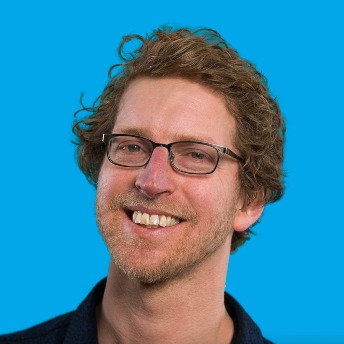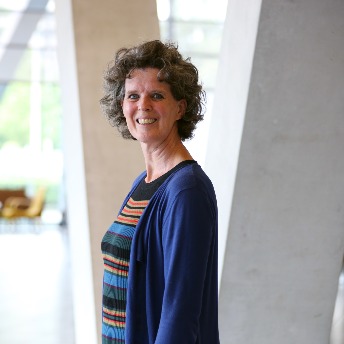Health Inequalities
Esther Metting
Esther Metting is psychologist and epidemiologist, currently working as assistant professor at the University of Groningen. Her dissertation (2017) was titled “Development of patient centered management of asthma and COPD in primary care” with a strong emphasis on the use of technology and patient involvement. Esther’s unique experience in clinical, behavioural and implementation science have led to a solid and multidisciplinary basis for eHealth research. In the past years she has coached and lectured numerous bachelor, master and PhD students with different backgrounds and from different faculties.
Esther managed several (international) research projects with scientists, health care professionals, patients, staff and students. Esther has chaired a large international research project in three European countries and the results of this project led to adaptation of clinical guidelines. She has worked as project manager eHealth in a large health care organization and is board member or advisor in several societal and patient organisations. Furthermore, she is an expert in the European Center for Disease Prevention and Control. Her hands-on experiences with patients, health care professionals and health care organisations are valuable in her daily work. Collaboration partners are among others: National eHealth Living Lab (NELL), International Primary Care Respiratory Group, Dutch Ministry of Health, international Respiratory Effectiveness Group.
Extra keyword: eHealth

Fanny Janssen
I am a senior researcher at the Netherlands Interdisciplinary Demographic Institute (The Hague) and Honorary Professor in “Mortality and Longevity” at the Faculty of Spatial Sciences. My research is at the interplay of Demography, Public Health and Geography. I focus on examining the role of health-related lifestyle factors (smoking, alcohol, obesity) in shaping mortality differences (e.g. between sexes, countries/regions) and mortality trends, and use this information to improve mortality forecasts. Currently I am leading a VICI project in which I focus on socio-economic inequalities in mortality, and how they will, realistically, further develop into the future.
Extra keyword: Life Expectancy

Marlies Hesselman
Marlies Hesselman is a lecturer in international law and a member of Global Health Law Groningen at the Faculty of Law. She is particularly interested in international law at the intersections of human rights, environment and health with a focus on the health impacts of climate change, disasters, energy poverty and air pollution. Marlies PhD specifically touches upon human rights and modern access to energy services.

Hinke Haisma
Hinke holds a position as professor in Child Nutrition and Population Health at the Population Research Centre (PRC), at the Faculty of Spatial Sciences, University of Groningen, the Netherlands. She has a background (MSc) in Human Nutrition from Wageningen University (1992), and a PhD in Medical Sciences from the University of Groningen (2004). She was a nutrition officer at the IAEA from 1995 to 1998, and was thereafter employed by WHO and seconded to the Federal University in Pelotas, Brazil (until 2002). Since 2009 she is employed at the PRC in Groningen, where she leads the research line Global Health & Development.
Her research focuses on people's capabilities in relation to child health and nutrition across the globe. In her research, she applies theories from various disciplines (social and behavioural sciences, evolutionary biology), and applies both quantitative and qualitative methods for data collection and analysis including ethnographic methods.
Her countries of study are Tanzania, India, Brazil, and the Netherlands.
Extra keyword: Child Nutrition

Raun van Ooijen
Raun van Ooijen is a Health Economist at the department of Health Sciences at the University Medical Center Groningen and University of Groningen and a fellow of Netspar. His research focuses on health-related risks over the life cycle, with an emphasis on work disability and long-term care. He is particularly interested in the value of social insurance programs to mitigate these risks and their effects on socioeconomic inequalities.

Viola Angelini
Viola Angelini is Full Professor in the Economics of Household Behaviour and Aletta Jacobs Chair at the Department of Economics, Econometrics and Finance, Faculty of Economics and Business of the University of Groningen. She is also a member of the editorial board of the Journal of Pension Economics and Finance and coordinator of the theme Justice of the Aletta Jacobs School of Public Health, focusing on socio-economic inequalities in health. In her research, she tries to understand what drives differences in individual physical, mental and financial well-being in adulthood and at older ages by taking a life-cycle perspective and using large scale individual-level data, both from survey and administrative sources. She maintains a large network of national and international collaborations: she is research fellow of the Global Labor Organization (GLO), the Network for Studies on Pensions, Ageing and Retirement (Netspar), the Netherlands Interdisciplinary Demographic Institute (NIDI), the Health Econometrics and Data Group (HEDG) of the University of York and the Center for Research on Pensions and Welfare Policies (CeRP) of the University of Turin. She holds a joint Ph.D. in Economics from the Universities of York and Padua.

Lucy Avraamidou
Lucy Avraamidou is the Director of the Institute for Science Education and Communication. She holds a PhD in Science Education from the Pennsylvania State University in the USA. Prior to her appointment at the University of Groningen (2016), she worked at the University of Nicosia in Cyprus and the Center of Informal Learning and Schools at King's College London. Her research is associated with theoretical and empirical explorations of what it means to widen and diversify STEM participation in school and out-of-school settings through the lens of intersectionality. At the heart of the account of her work is an exploration of underrepresented groups' identity trajectories and negotiations with the use of narrative and life-history methods.

Merit Hondelink
Merit Hondelink is a trained archaeobotanist and historian. She is a PhD-candidate working on her NWO-funded research titled: A taste of historic cookery: a reconstruction of the daily meal as prepared by common burghers of Early Modern Dutch cities, AD 1500-1850. The main aim of her research, supervised by René Cappers (Groningen University) and Bruno Blondé (University of Antwerp), is to expand our knowledge of the past food and alimentary practices of the common Dutch burgher. The central question that will be addressed in her research is: what did common burghers of Early Modern Dutch cities eat, how did they prepare their daily meal and how did these food and alimentary practices change through time? In order to contribute to the development of a better understanding of this topic, Merit adopts a multidisciplinary approach and compares and integrates the information obtained from bio-archaeological, historical and gastronomic (experimental cooking) research.

Richard Rijnks
I am Richard Rijnks and I work as an Assistant Professor at the Faculty of Spatial Sciences at the University of Groningen. My health-related research focuses on the role spatial configurations can play in the production and reproduction of health and well-being inequalities, and how these inequalities affect the individuals in those neighbourhoods. How do happier and higher quality neighbourhoods affect house prices, well-being, and development, and how do local cultures of healthy and unhealthy behaviour impact on the longer term outcomes for their residents. For the immediate future, I am turning my attention to the role spatial policy can play in neighbourhood health and well-being outcomes.

Katherine Stroebe
Katherine Stroebe is professor in social psychology at the University of Groningen. She holds the chair ‘the Social Psychology of Justice and Resilience’. Katherine is also director of the expertise centre “Social Sciences, Health and Wellbeing” and is the coordinator of the “Resilience” track of the Aletta Jacobs School of Public Health. Since 2016, Katherine has headed a large-scale government funded research project into the psychosocial impact of the gas extraction in Groningen.
Katherine’s research focuses on people’s responses to individual and collective justice violations and the extent to which such responses enhance resilience rather than vulnerability. Collective justice violations, such as being discriminated against or being the victim of man-made earthquakes have always fascinated Katherine. Such violations can induce conflict-oriented behavior: protests, demonstrations and ultimately wars. Katherine is interested in what makes people abstain from conflict-oriented behavior - inducing behavior that may seem passive (but is not). Moreover, Katherine studies the long-term impact of experiences of (chronic) collective injustice on health and wellbeing, to better understand long term resilience in response to injustice, for example in the context of the gas extraction in Groningen.

Laura Baams
Laura Baams is an Assistant Professor in the Youth Studies Research Group, in Pedagogy and Educational Sciences. Overall, her research addresses health disparities among LGBTQ youth, and how these can be exacerbated or diminished by social environmental factors.

Mónica López López
Mónica López López is an Associate Professor at the Faculty of Behavioural and Social Sciences. For the last 16 years, Mónica has been actively seeking a way of improving child and family welfare systems through research on decision-making, with a special interest in disparities in decision-making processes. In her research, Mónica focuses on the voice of the service users, children and families, as a powerful instrument to develop better services. Her recent projects include Hestia, a European funded project comparing policies and practices of child protection in England, Germany and the Netherlands (NORFACE, H2020); project Audre on the wellbeing and resilience of LGBTQIA+ young people in out-of-home care (FWOS); and Brighter Future on the educational experiences of children in care and adopted (Erasmus+). Mónica has been involved in transferring scientific knowledge through her teaching at the international master Youth Society and Policy, training professionals, and developing international research networks in Europe and Latin America. She is a board member of EUSARF (European Scientific Association on Residential and Family Care for Children and Adolescents), and iaOBERfcs (International Association for Outcome-based Evaluation and Research on Family and Children’s Services).

Job van 't Veer
Dr. Job van 't Veer is professor Digital Innovation in Healthcare at the NHL Stenden University of Applied Sciences. As a researcher, he is always focused on the social participation of vulnerable groups, such as people with mental illness, mild intellectual disorders, and dementia.
Since 2012, he has focused on digital innovation in healthcare and welfare. Within all research projects, the emphasis is on a design-research approach: how can you, together with clients, residents, and professionals, innovatively and possibly digitally, improve healthcare and welfare? Apart from supervising PhD-students in their design research projects, he is main author of the book ‘Ontwerpen voor Zorg en Welzijn’ (Design for Healthcare & Social Work), which is used in about 50 bachelor-programs in Dutch/Belgian Universities of Applied Sciences.
Job van ‘t Veer is co-program leader of SIA SPRONG FAITH research, a network of more than 40 healthcare organizations and companies that generates and shares knowledge on frailty. He is associated in many (Northern) networks and projects that involve the topic of health technology, like HEALTHNoord, HTRIC, AndersWerkenindeZorg, TZA Drenthe, NWA eHealth Junior, Bridge2Health, PIT and MEE Lab.

Jolanda Tuinstra
Jolanda Tuinstra was trained as a medical sociologist and obtained her PhD for a study into the health of young people and the influence of the social context in which they grow up. She then conducted various studies on, for example, 'quality of life', 'participation in everyday life' and 'evaluation of care'. When conducting research, she always seeks connections between researchers, students, teachers and practice. Preferably with the people where the question comes from. Since March 2020, Jolanda Tuinstra has been working as a lecturer in Social Quality at the NHL Stenden University of Applied Sciences, where she focuses on the quality of life of individuals and collectives, and the interaction between informal and formal relationships.

| Last modified: | 10 June 2024 12.45 p.m. |


